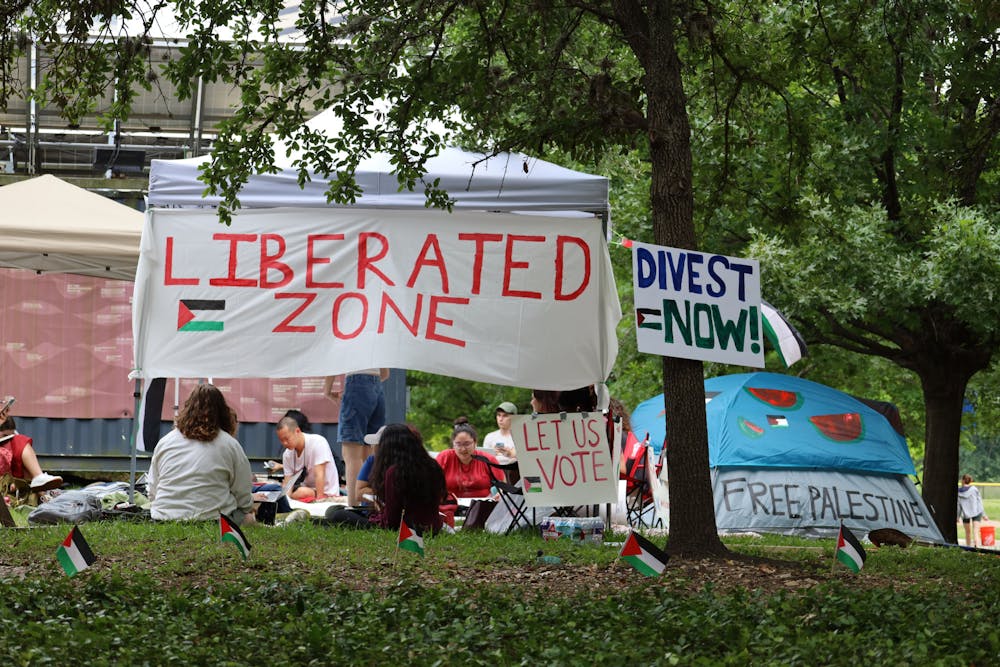Rice Students for Justice in Palestine declares ‘liberated zone’ on campus
Activists to build an ‘apartheid wall’ across from Baker Institute

As student protests erupt across the country, Rice Students for Justice in Palestine launched a “liberated zone” on Rice campus, announced a two-day series of events and started construction on an “apartheid wall.”
The “liberated zone” opened Tuesday afternoon at the Solar Studios exhibit, across from Kraft Hall and next to the PCF tents. The schedule posted on Rice SJP’s Instagram account says the events will run through 10 p.m. Tuesday, then resume from 10 a.m. through 10 p.m. Wednesday, April 24.
“We’re trying to liberate this space for a popular university where we can bring education that is not taught at Rice, bring education around the issues of the genocide we’re seeing now, talk about the history of Palestine, the history of resistance, the history of occupation,” said Matti Haacke, a Sid Richardson College junior and organizer with Rice SJP.
A few dozen students, faculty and community members were present at the “liberated zone” throughout the day.
Haacke said the “apartheid wall” will be an 8 foot by 12 foot structure with a mural. It mirrors the separation barrier Israel constructed more than 20 years ago in the occupied West Bank, Haacke explained.
“We’re going to have a mural on it symbolic of Palestinian life and Palestinian resistance, that we hope to keep up for as long as possible,” Haacke said. “It’s also a symbolic place because it’s just across the corner from the Baker Institute and the Berlin Wall. It provides an interesting dichotomy between the ‘western wall’ and the resistance of the Palestinians.”
Haacke said Rice SJP will continue to protest until Rice meets its demands. This includes allowing a vote on a tabled Student Association resolution that would prohibit clubs from spending student activity fee disbursements at companies on the Boycott, Divestment, Sanctions list. Additionally, Haacke said Rice SJP is calling for transparency in Rice’s investments and divestment from Israeli entities across academic and research partnerships and sponsorships.
A Rice spokesperson wrote in a statement that the university strives to balance personal expression with campus safety.
“The small, student-led teach-in of about 25 students took place at an isolated location that did not disrupt campus activities,” the spokesperson wrote. “While we honor personal expression and academic freedom at Rice, we must also maintain a safe campus for all students. Fortunately, the student organizers agreed to modify their original plans related to structures and sound levels to maintain an environment of respectful discourse.”
The “liberated zone” on Rice campus follows a tense week of student protest at universities nationwide.
On April 18, the Columbia University president asked the New York Police Department to sweep the “Gaza Solidarity Encampment” on the university’s main lawn. Officers in riot gear arrested more than 100 students, the Columbia Spectator reported, and the university issued suspensions.
Student activists at other universities have pitched their own tents in response.
At Yale University, police arrested 47 students on the third day of their encampment on Monday, April 22. The NYPD arrested another 120 protestors, including students and faculty, at New York University later that day. Pro-Palestinian groups are leading similar encampments at campuses across the country, including the Massachusetts Institute of Technology, the University of Minnesota and the University of California, Berkeley. California State Polytechnic University, Humboldt has closed its campus through Wednesday after a group of students barricaded themselves inside a university building. And protests have only grown at Columbia, where classes are now hybrid through the rest of the semester.
“We’re seeing this … resurgence of this political strategy on campuses in a way that we have never seen on this scale and not seen at all since the Vietnam War era,” Haacke said. “It’s really [about] taking up this land of these universities that are profiting off genocide and saying that we will not leave, we will put our bodies on the line, we will get arrested.”
More from The Rice Thresher

Worth the wait: Andrew Thomas Huang practices patience
Andrew Thomas Huang says that patience is essential to being an artist. His proof? A film that has spent a decade in production, a career shaped by years in the music industry and a lifelong commitment to exploring queer identity and environmental themes — the kinds of stories, he said, that take time to tell right.

Andrew Thomas Huang puts visuals and identity to song
Houston is welcoming the Grammy-nominated figure behind the music videos of Björk and FKA twigs on June 27.

Live it up this summer with these Houston shows
Staying in Houston this summer and wondering how to make the most of your time? Fortunately, you're in luck, there's no shortage of amazing shows and performances happening around the city. From live music to ballet and everything in between, here are some events coming up this month and next!

Please note All comments are eligible for publication by The Rice Thresher.